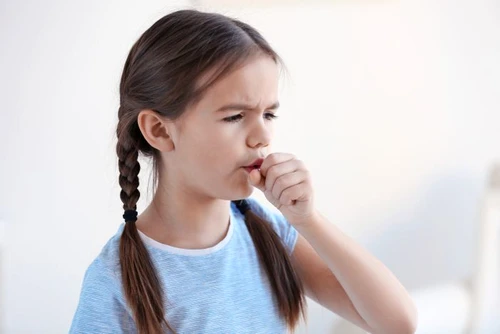
Even if coughing is a natural defense reflex of the body through which the accumulated mucus is eliminated, in certain situations, it is an alarming symptom and can be an indication of the installation of a serious condition such as asthma.
Excessive coughing in children can signal a viral respiratory infection, nasopharyngitis, laryngitis, bronchitis or pneumonia, but sometimes it can be related to asthma, gastroesophageal reflux or an allergy. When a persistent cough is caused by asthma, the lungs and airways become easily inflamed under the impact of triggers, such as pollen inhalation or a respiratory infection. Asthma in children can cause symptoms that disrupt their daily activities, play, sports, learning and even sleep. Undetected in time, it can cause dangerous attacks.
What manifestations are worrying
Not only coughing can signal the presence of a disease such as asthma. Other signs that give a parent to think about are the presence of wheezing when the child breathes or shortness of breath. To these can be added sleep problems due to breathing difficulties and a fatigue that prevents the little one from even playing. Symptoms vary and may worsen or improve over time. There are cases where only 2 main signs are present: persistent cough and a feeling of pressure in the chest area. On the other hand, periodic or long-lasting wheezing and other asthma-like symptoms can also be caused by an infectious bronchitis or other respiratory problem.
When to see a doctor
The cough usually goes away after 10 days. If it does not stop, do not hesitate to contact the pediatrician. A correct diagnosis and early treatment will keep the symptoms under control and prevent asthma attacks, if this disease is detected. Mention all the symptoms to the doctor, in order to establish a correct diagnosis. Do not forget to say if, in addition to the constant, tiring cough, which intensifies with strong emotional reactions, he also has wheezing, reduced appetite, restless sleep, interrupted by coughing fits. If the pediatrician considers it necessary, he will make a referral to a pulmonologist or allergist, for investigations such as spirometry and allergy tests to show the triggering factors of a possible asthma attack. Unfortunately, asthma cannot be cured, but with the right treatment, symptoms can be controlled and lung damage can be prevented.
Correct treatment of cough
Regarding children younger than 2 years old, who have a productive cough, it is advisable not to intervene with any syrup or other treatment, to allow the discharge of secretions. And treatment with drugs administered behind the ear, through nebulization, can lead to the descent of secretions to the lungs. Seek emergency medical attention if you notice that he has serious breathing problems. Asthma episodes vary in severity, but asthma attacks may begin with coughing that progresses to wheezing and visibly labored breathing. In severe cases, the chest and sides may retract a lot as the child struggles to breathe. It is also possible that these signs are accompanied by an increased frequency of beats, sweating and chest pain.
Advice
Children must be protected from cigarette smoke, even more so if they are coughing.
Careful!
In children under 6 months of age, a cough is a serious reason to contact a pediatrician urgently.
Expert advice
Dr. Genoveva Hiastru, pediatric specialist, Aurora Pediatric office, Bucharest
The purpose of the medication is to calm a dry cough and help expectoration by fluidizing the secretions in the case of a productive cough. In most cases, the cough is part of the normal evolution of the disease and should not be inhibited, with the exception of a severe cough that disturbs the child’s sleep, activity and nutrition. Do not use cough medicine for children under 2 years old! If the child is less than 3 months old and the cough is accompanied by fever, it should be taken to the nearest pediatrician to be examined. As a general rule, valid for all children, the difficult cough, with spasms, with fits, which triggers cyanosis, vomiting,
loss of consciousness, which is accompanied by abnormal breathing noises or retraction of the intercostal muscles, must go to the doctor for investigations.






































